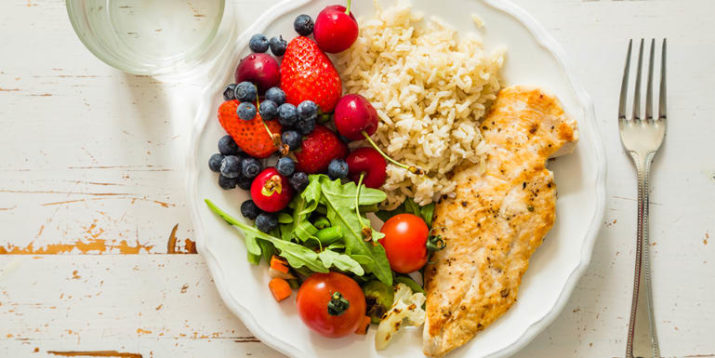Nutrients 101: What’s Essential for a Healthy Diet

Are you one of the millions of users who uses an app to track calories? If so, you’re no stranger to managing your daily protein, carbohydrate, and fat consumption. But why do we need these and other nutrients to stay healthy and in shape?
Proteins, fats, and carbohydrates give you the energy to sustain growth and perform a slew of other bodily functions. Regardless if you want to improve your overall wellness or are looking for a healthy diet to lose weight, these macronutrients — the word “macro” means large — are the major nutrients our bodies need in large quantities.
Protein
The Health and Medicine Division (HMD) of the National Academies of Sciences recommends women 19 years of age and older get 46 grams of protein a day, and men ages 19 and older get 56 grams per day.
Don’t just stick to meat as a protein source of your healthy diet— fish, nuts, dairy, soy-based foods, beans, seeds, eggs, and vegetables are valuable sources of protein, too. Strive for diversity in your diet to get a variety of vitamins and minerals.
Carbohydrates
You may go to great lengths to avoid carbs, but they’re necessary to fuel your body and workouts. In fact, the Recommended Daily Allowance (RDA) for women and men is 130 grams per day.
Instead of eating white bread, potatoes, and pastries, fuel up on vitamin-rich foods like fruits and vegetables, and whole-grain foods such as steel-cut oats and brown rice.
Fats
There is no RDA for fat intake, but healthy fats remain essential to keep your body going, too. You’ve heard about “good” and “bad” fats — good fats include monounsaturated and polyunsaturated; less healthy fats include saturated and trans fats. Focus on unsaturated fats; these are found in oily fish like salmon, as well as oils made from plants (such as olive and walnut oil). Other great sources of fats to fuel up on include nuts, like almonds and pistachios; seeds, like flax and pumpkin seeds; and fruits, like avocado.
Fats help you absorb vitamins and other nutrients to help keep your immune system strong, vision sharp, skin healthy, muscles lean, and much more.
Micronutrients
We also need micronutrients, also referred to as vitamins and minerals, from food. While there are dozens of important micronutrients, the list below includes some of the ones many people struggle to get enough of.
Iron deficiency (or anemia) is probably the most common mineral deficiency. In fact, a 2014 study reported that over 15 percent of pre-menopausal women in the United States may not be getting enough iron. The same study revealed that female athletes may lack adequate levels of two other micronutrients — calcium and vitamin D — if they combine suboptimal diets with heavy amounts of physical activity.
Good sources of iron include lean meats and seafood, as well as nuts like cashews, pumpkin seeds, and dark leafy greens.
Vitamin D deficiency is at all all-time high, and it doesn’t seem to matter if you live in sunny California or Antarctica. Experts attribute this to three factors: we spend less time in the sun, use sunscreen, and cover up to avoid the sun’s rays. To avoid risks associated with not getting enough D — the National Academy of Sciences recommends 600 IU per day for adults under the age of 70 — add oily fish like salmon and mackerel to your diet. Milk and other dairy products fortified with vitamin D are also good options; vegans can choose almond or soy milk fortified with calcium and vitamin D.
We need calcium for healthy bones and to keep the nervous system functioning optimally. Calcium and vitamin D work hand-in-hand; vitamin D helps your body absorb calcium. Like other minerals, calcium is lost through sweat, and excreted in the urine. The RDA for calcium is 1000 mg per day until the age of 50. After 50, women should increase calcium intake to 1,200 mg per day. Great sources of calcium include milk, cheese, and yogurt. Leafy greens such as collards and kale are also good choices.
Make room for each of these important nutrients on your plate. You’ll be rewarded with a strong, healthy body, and see progress in the gym to boot.
